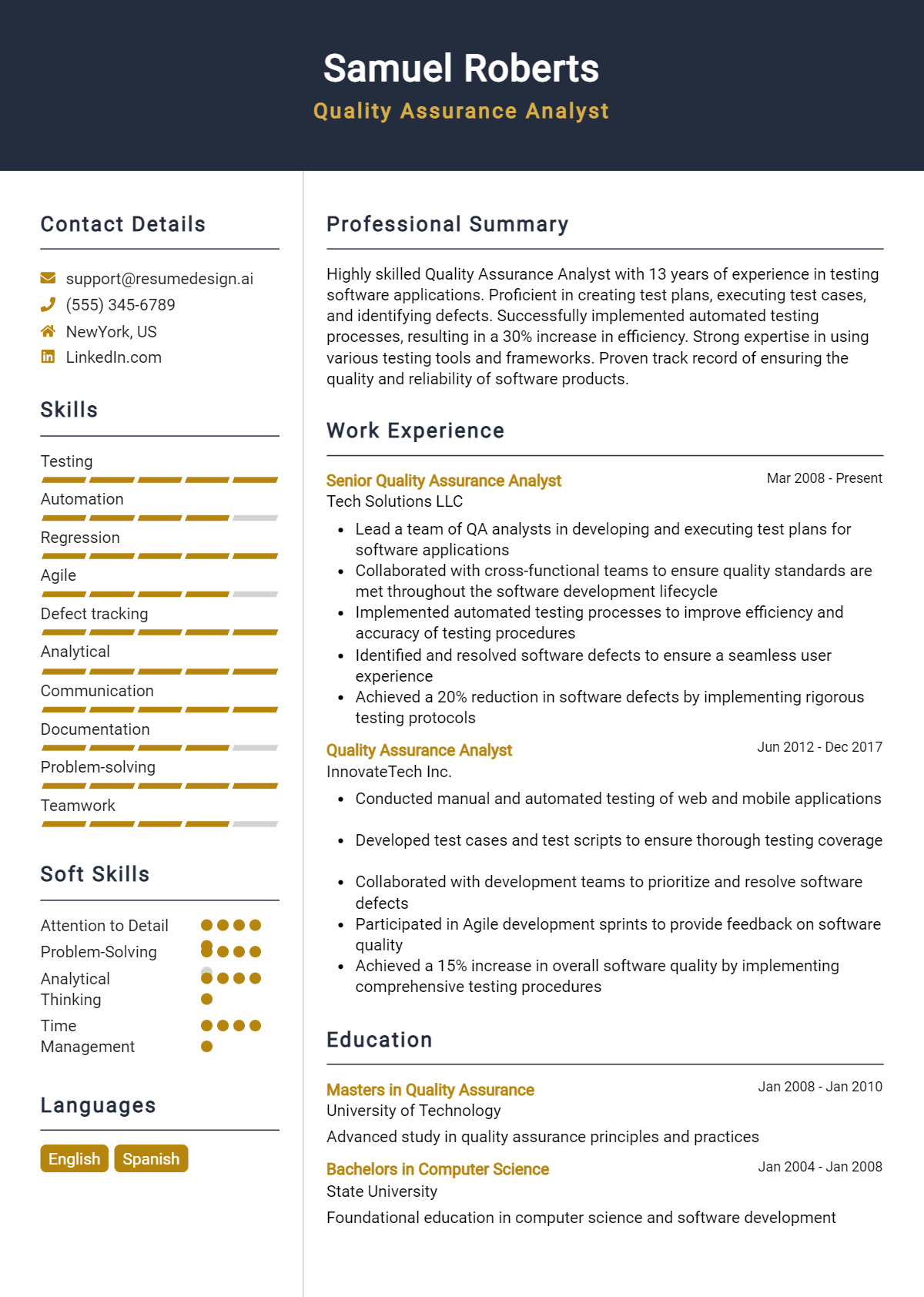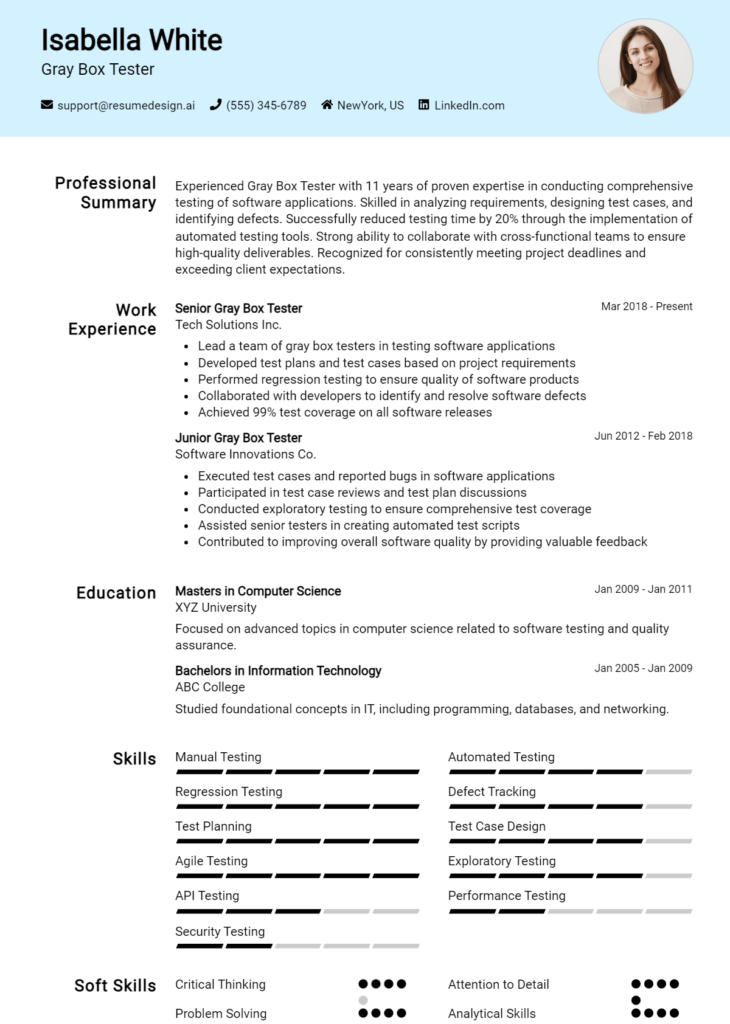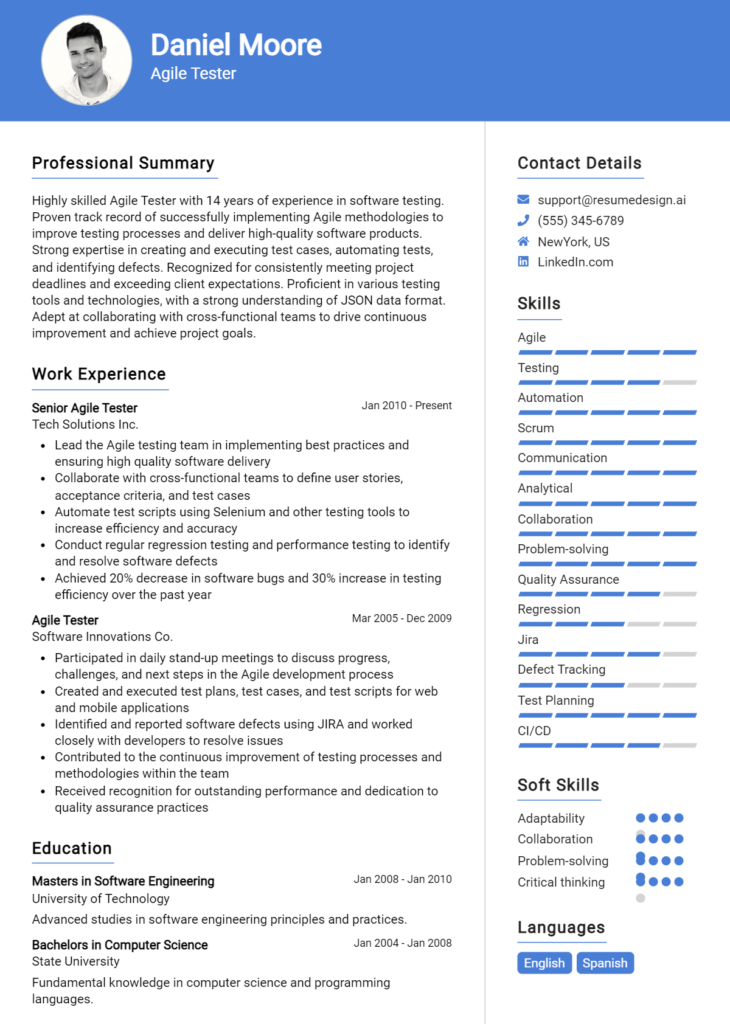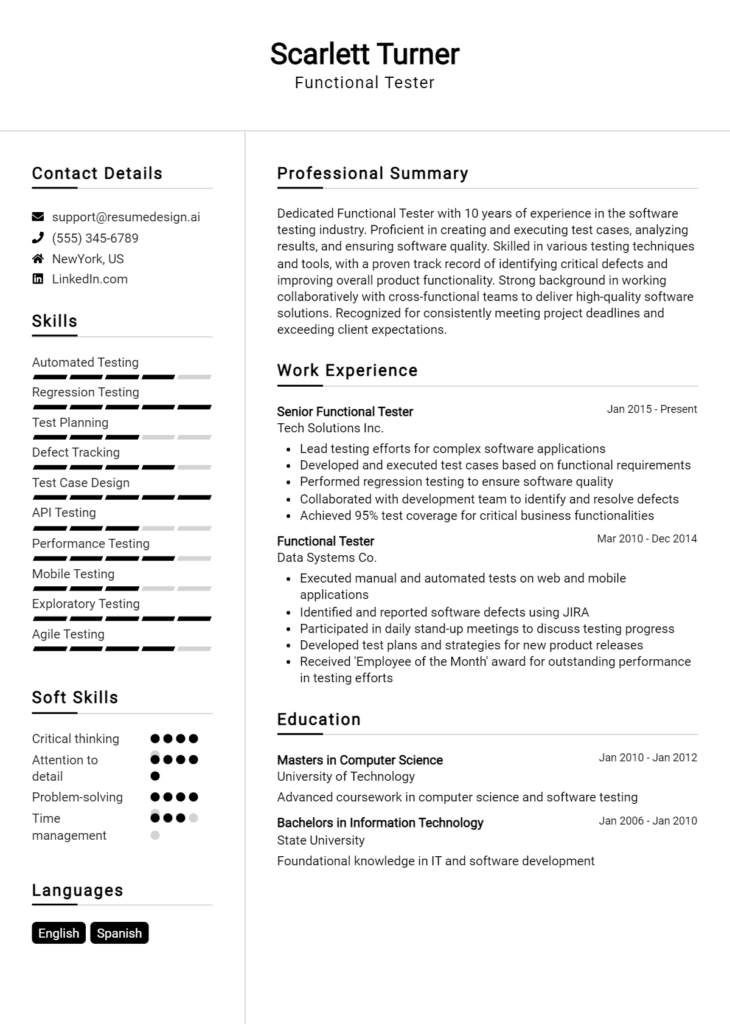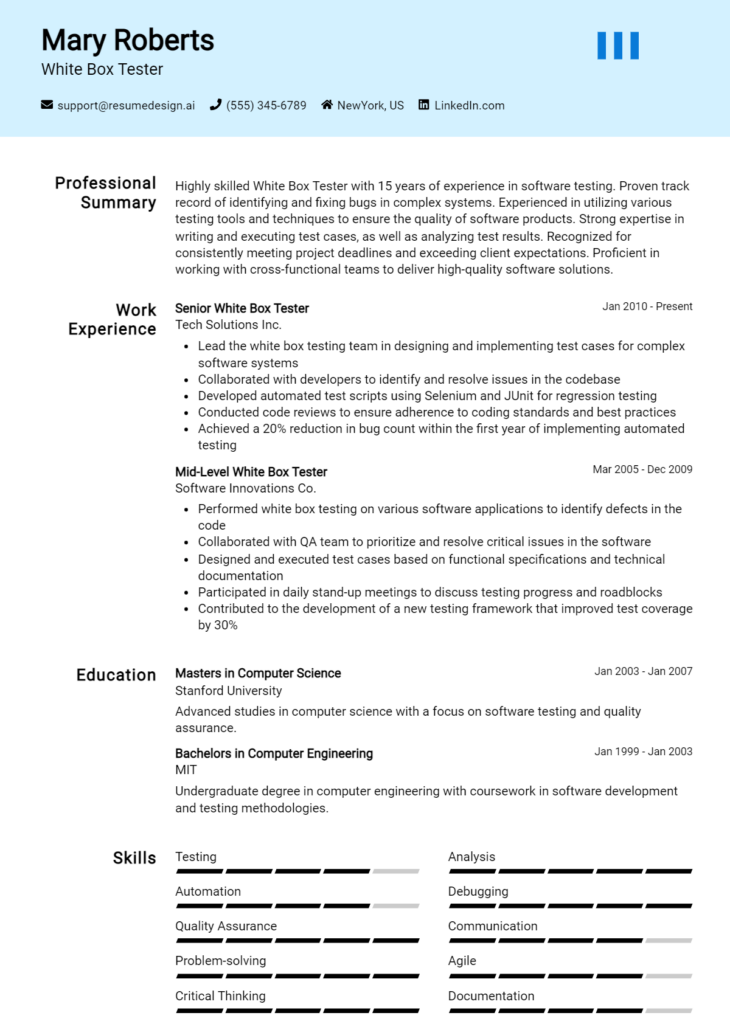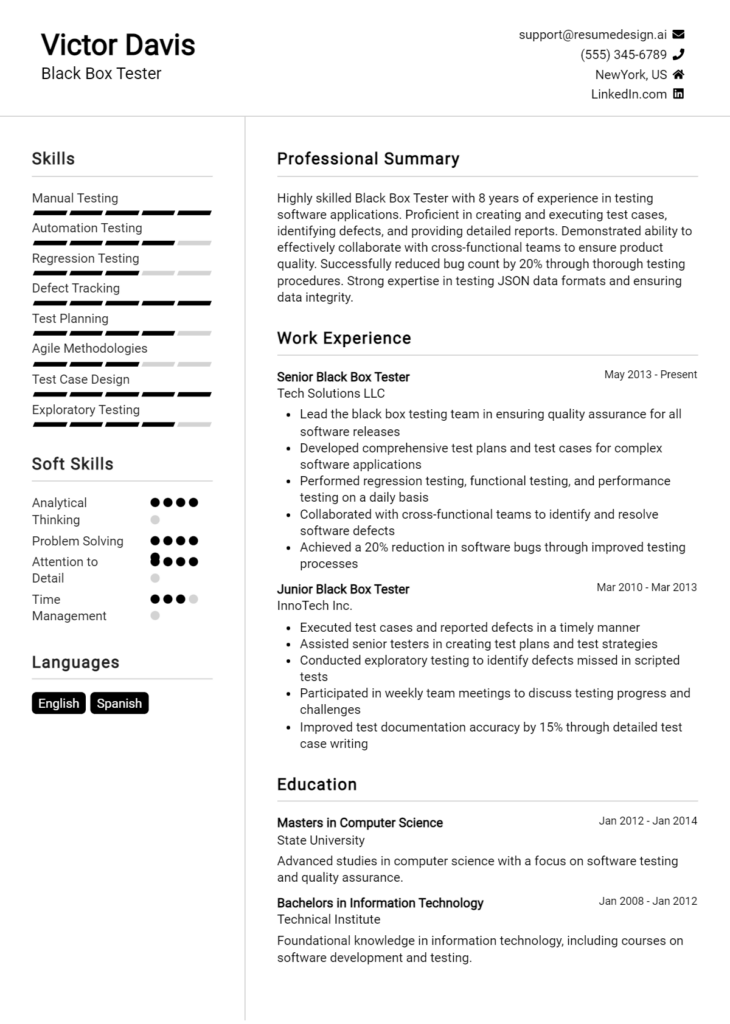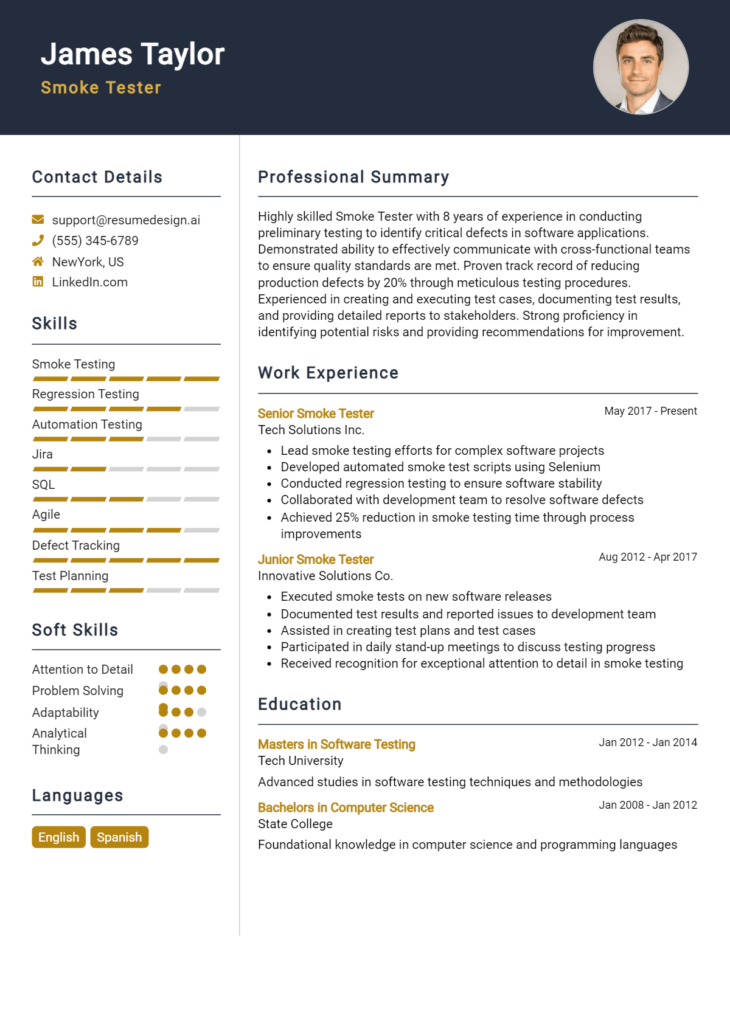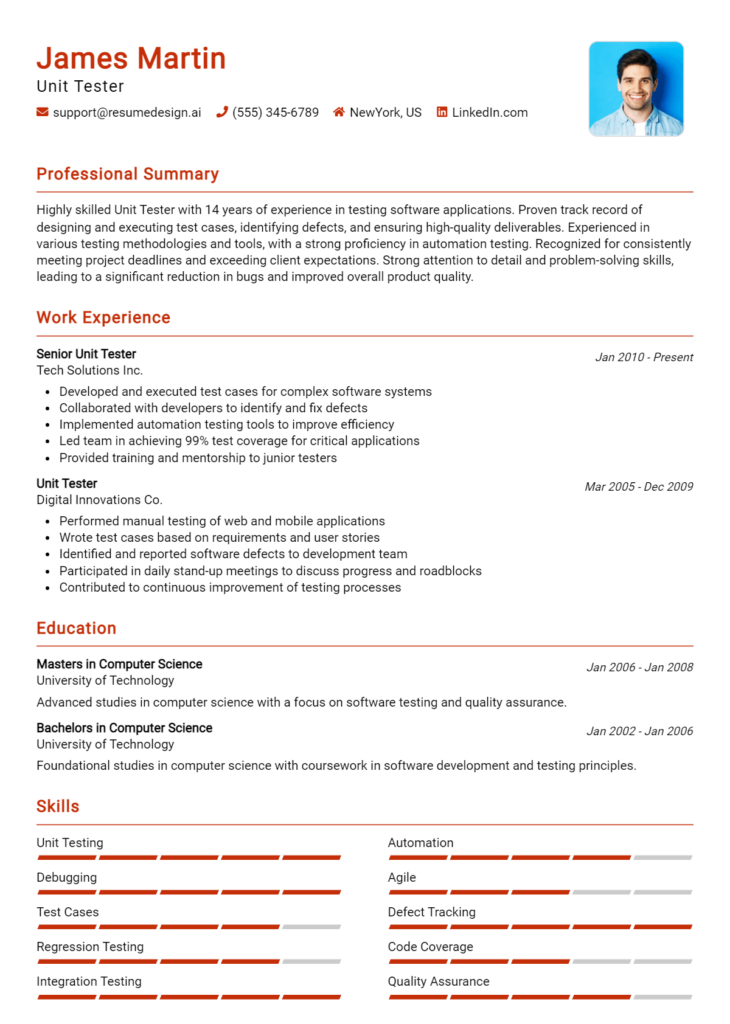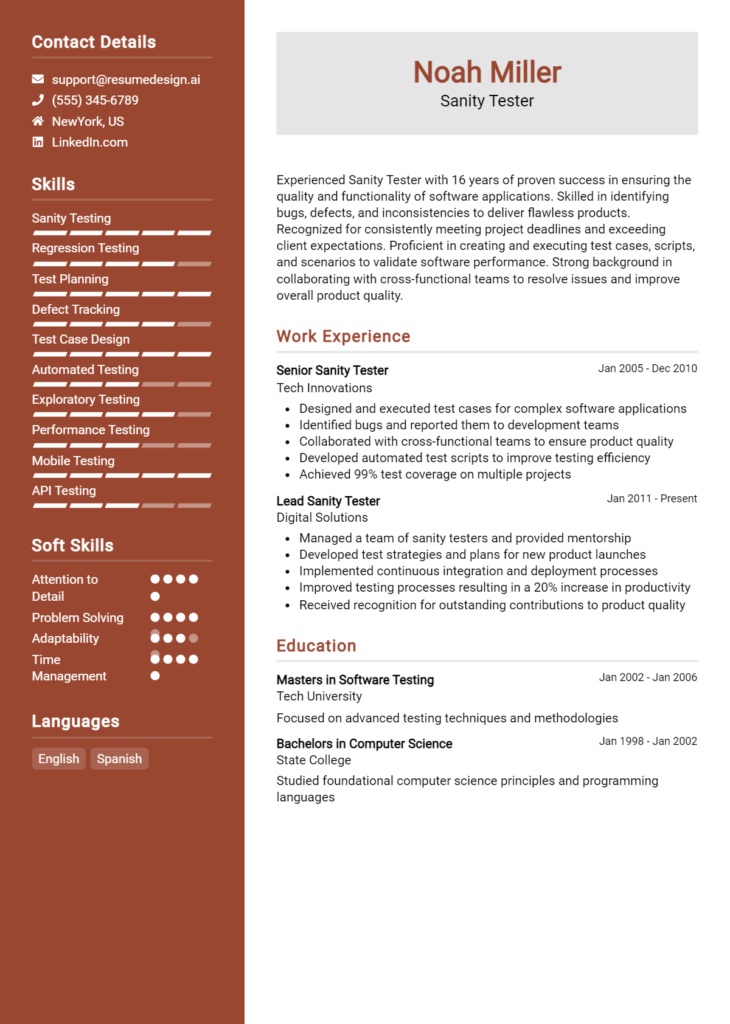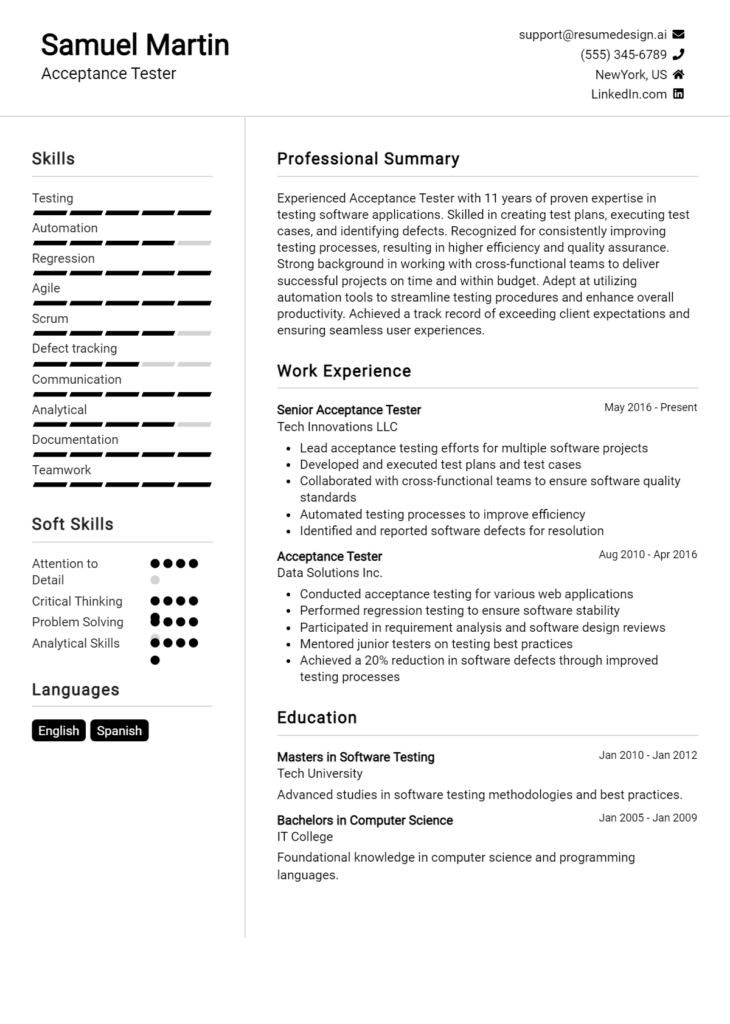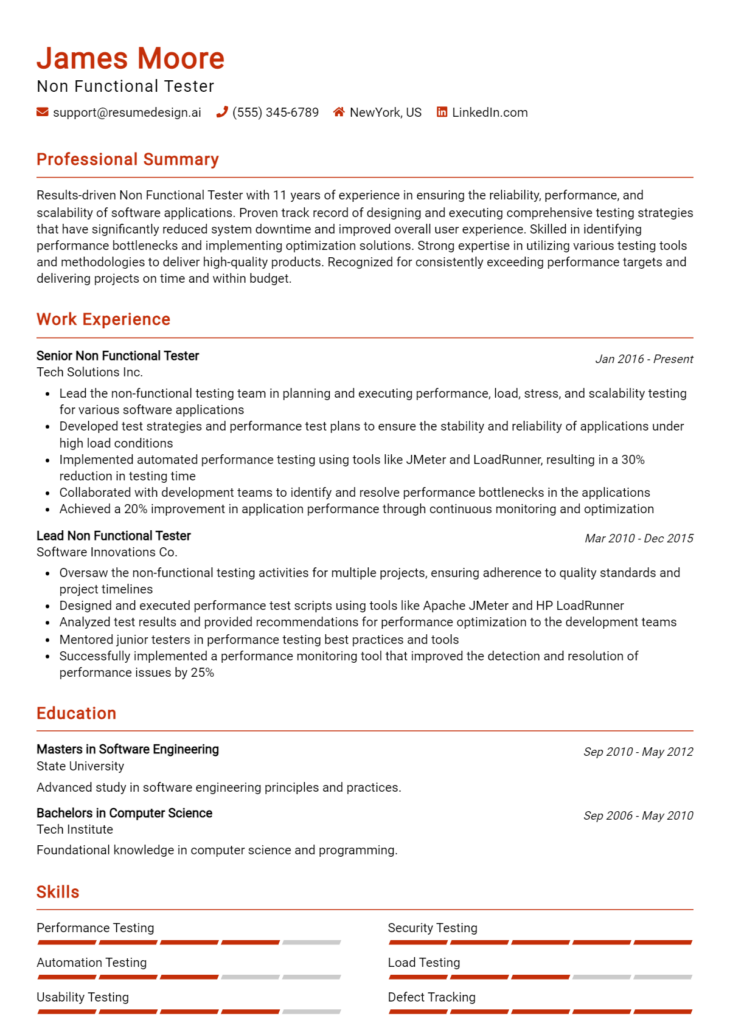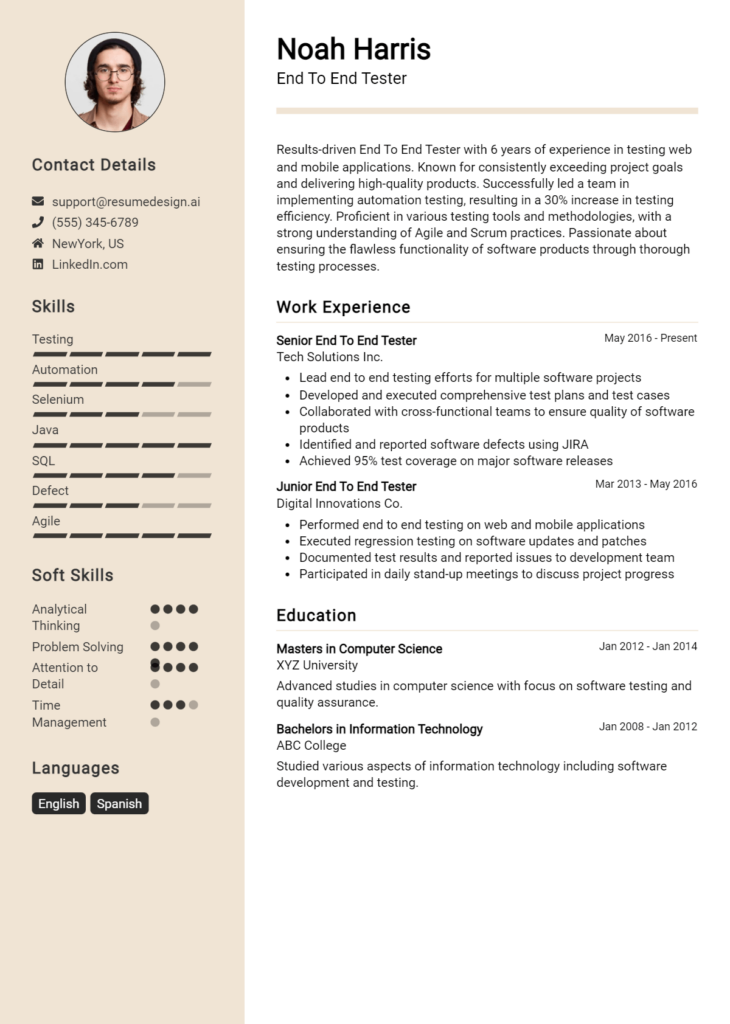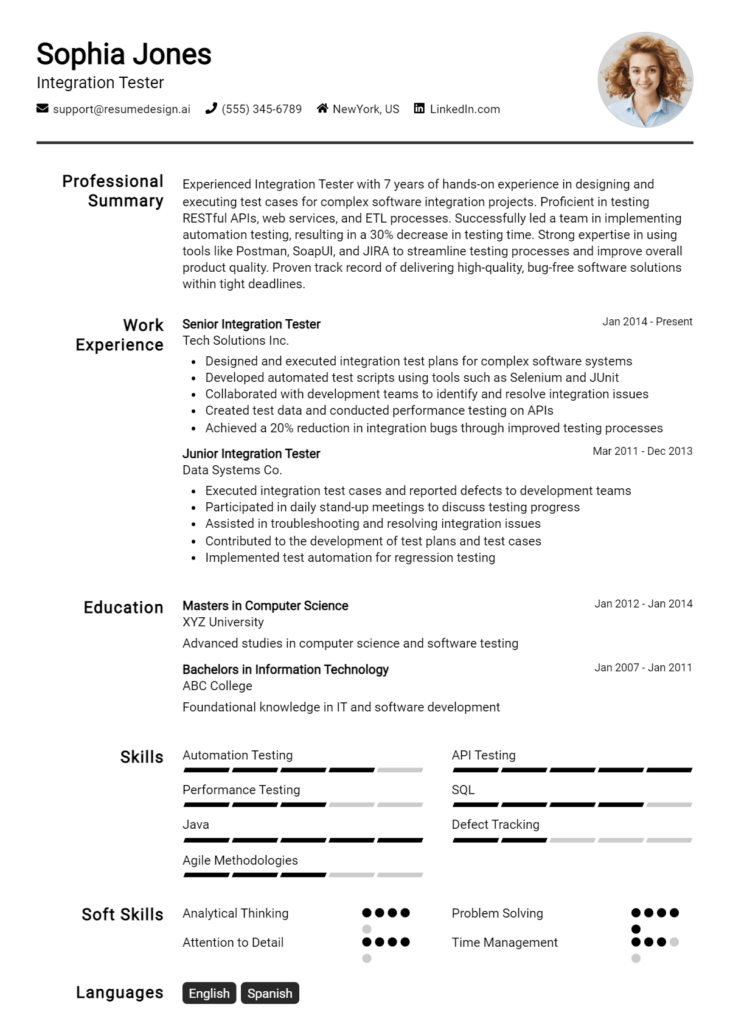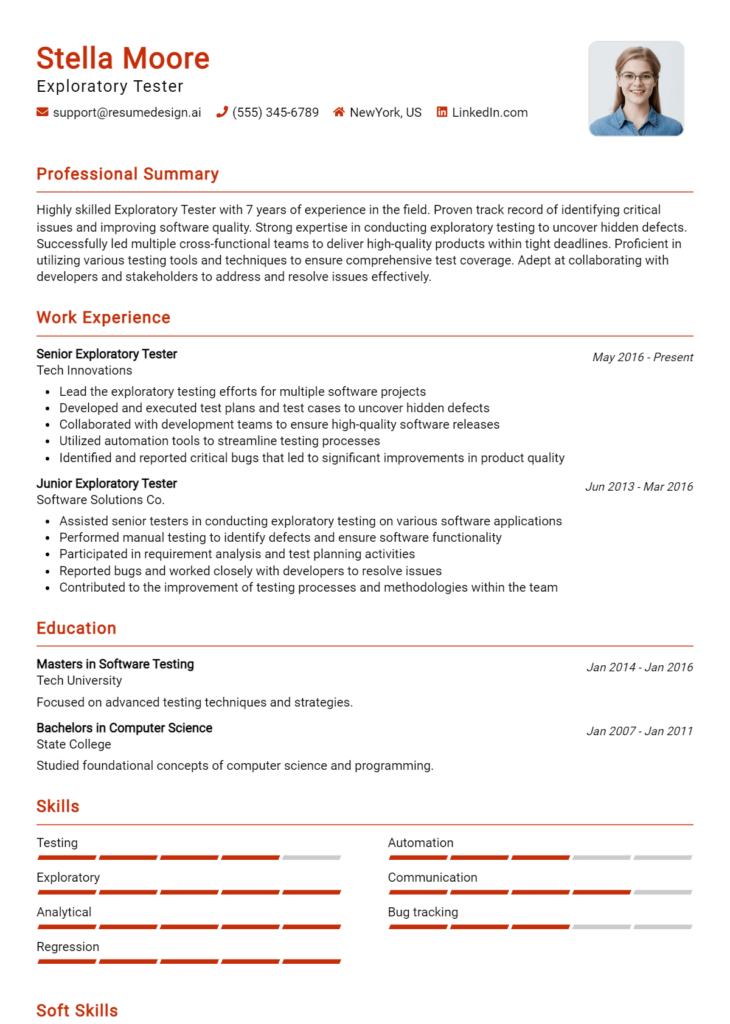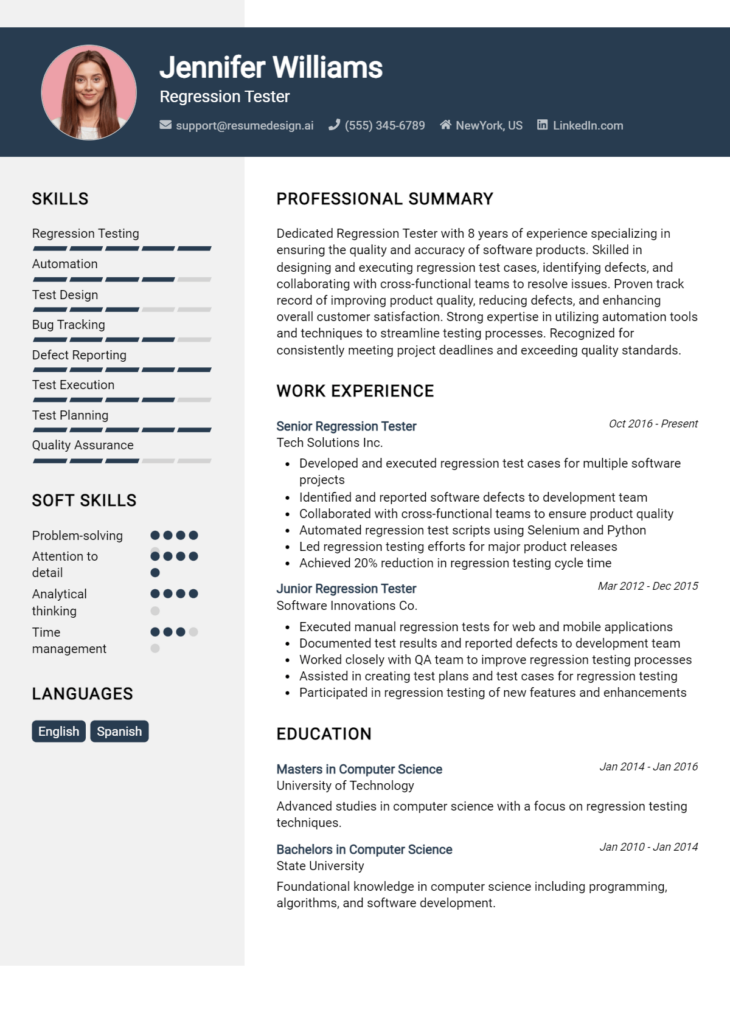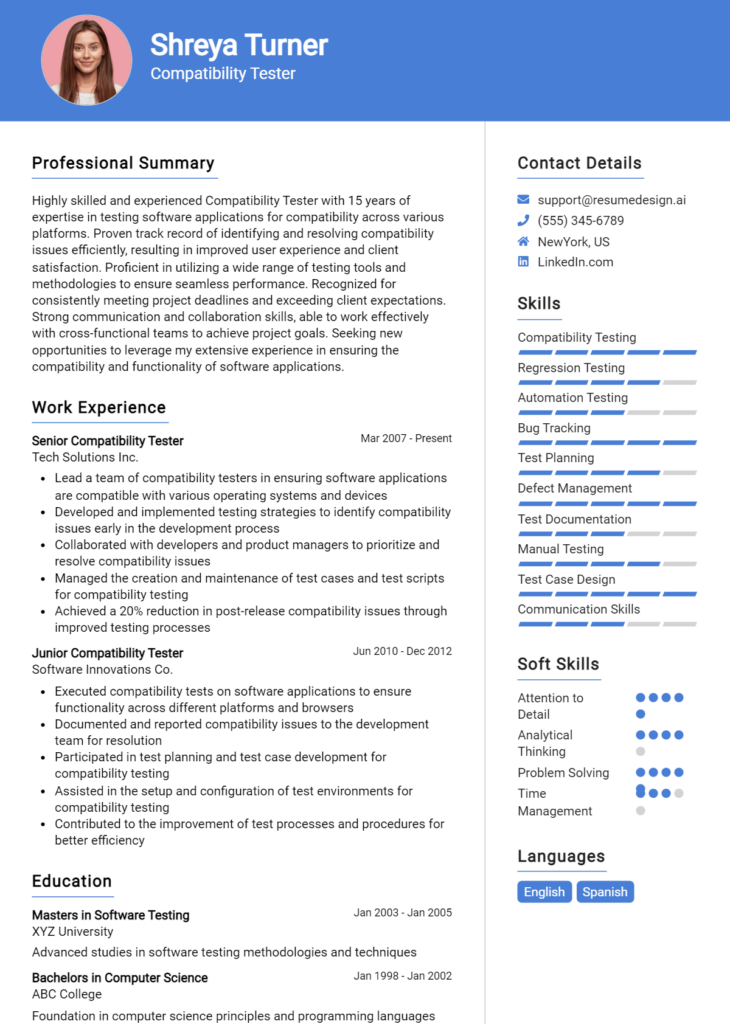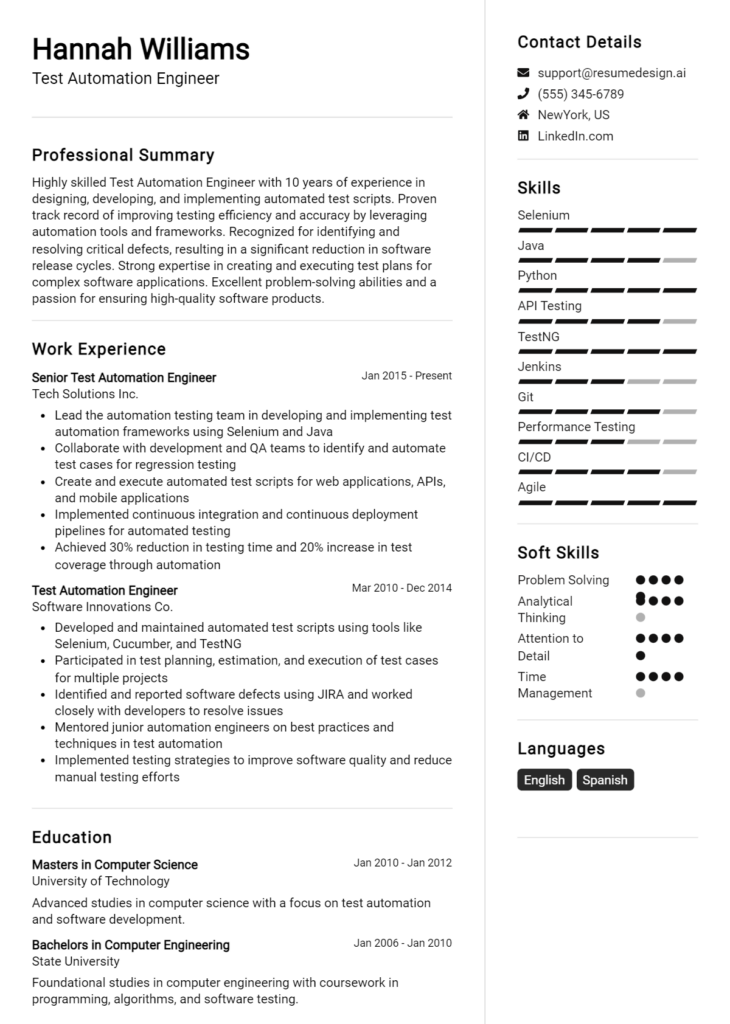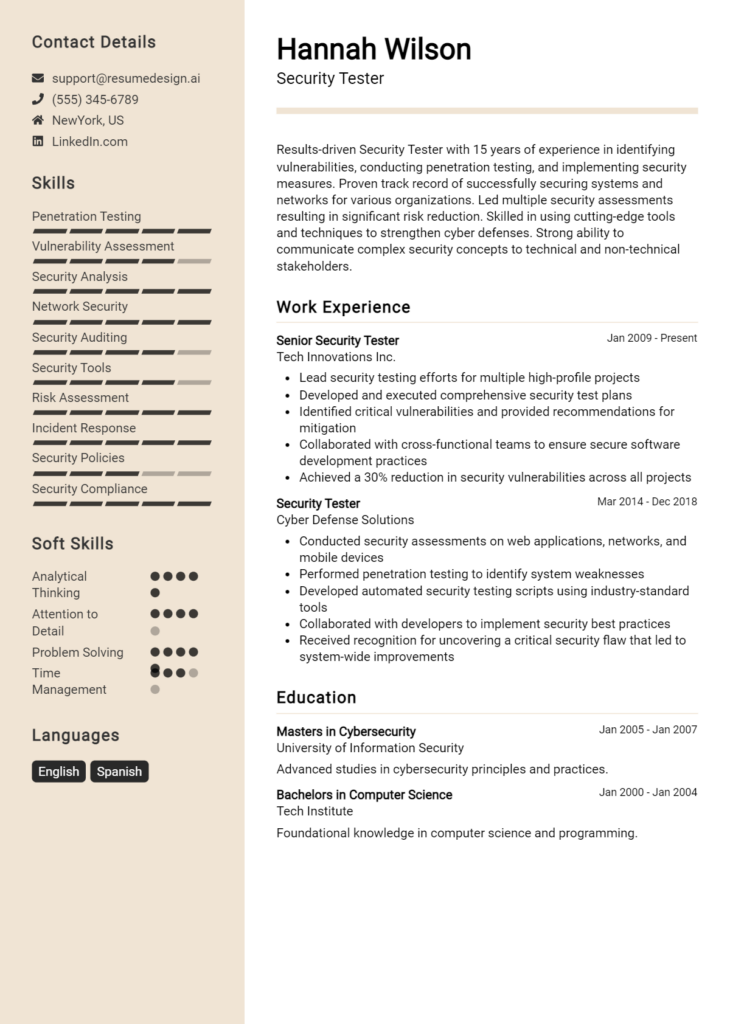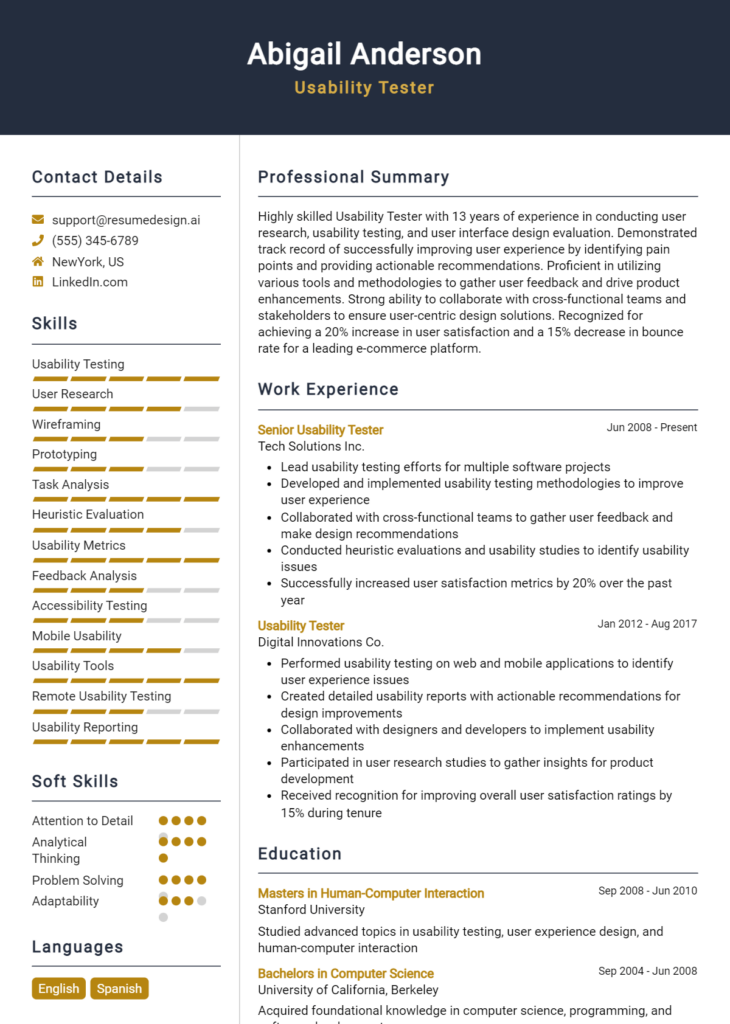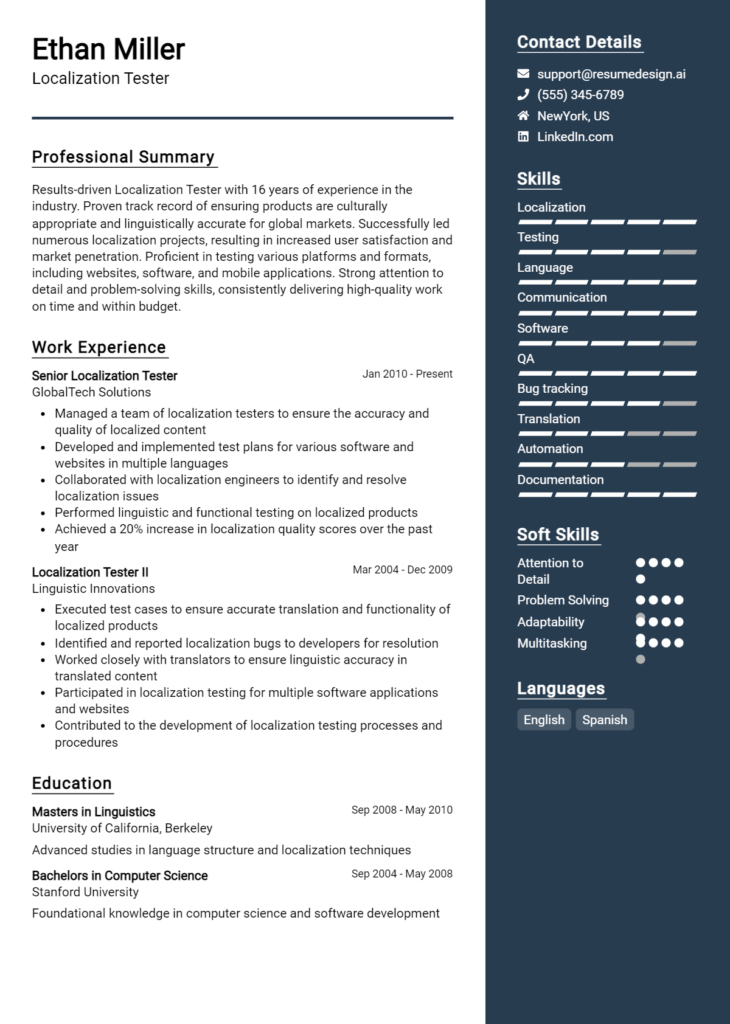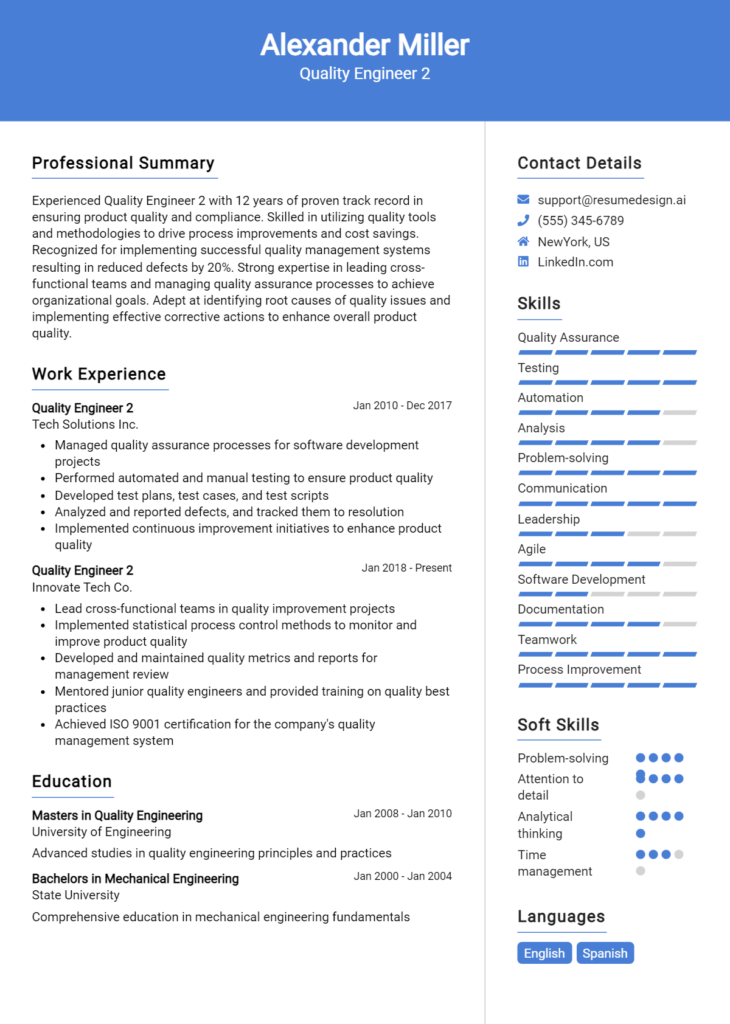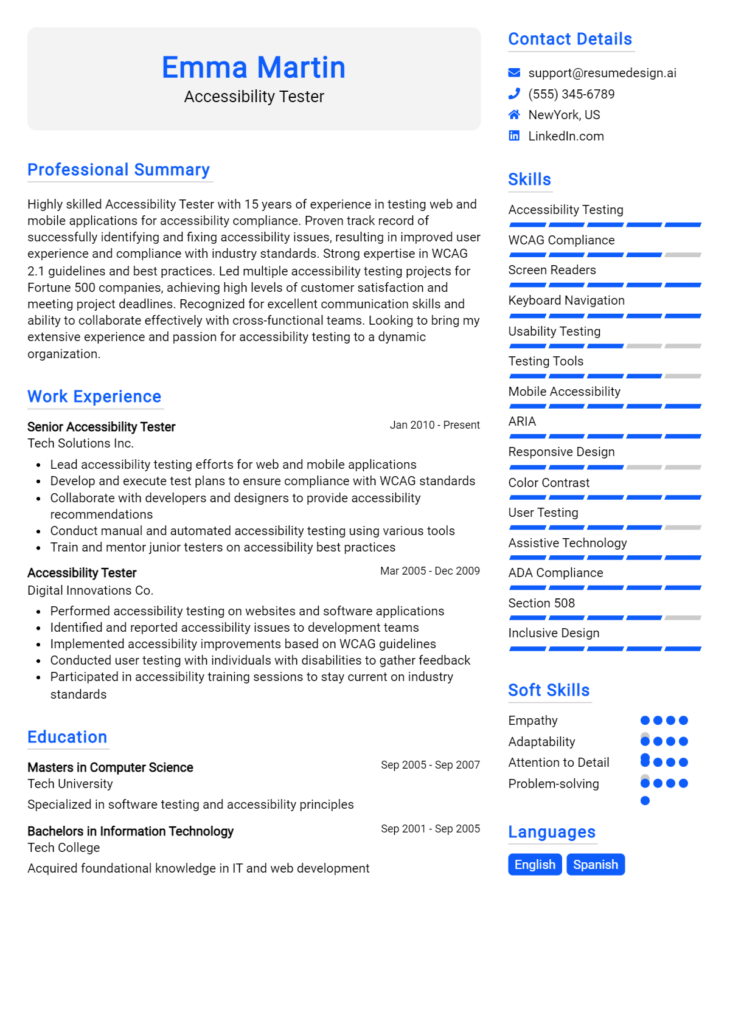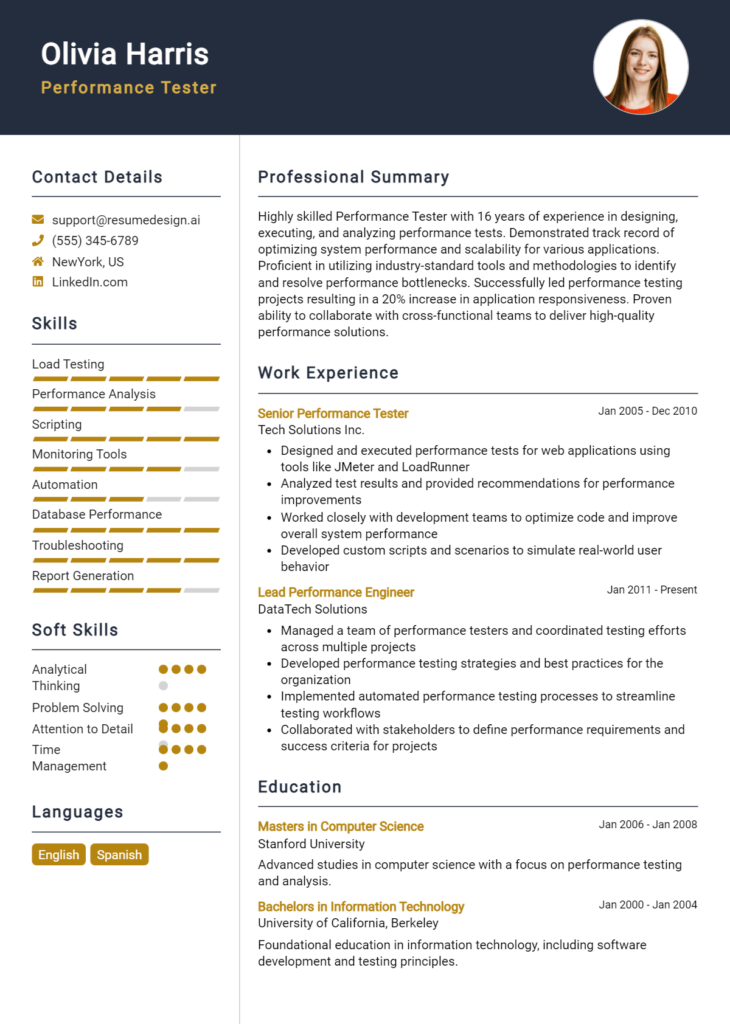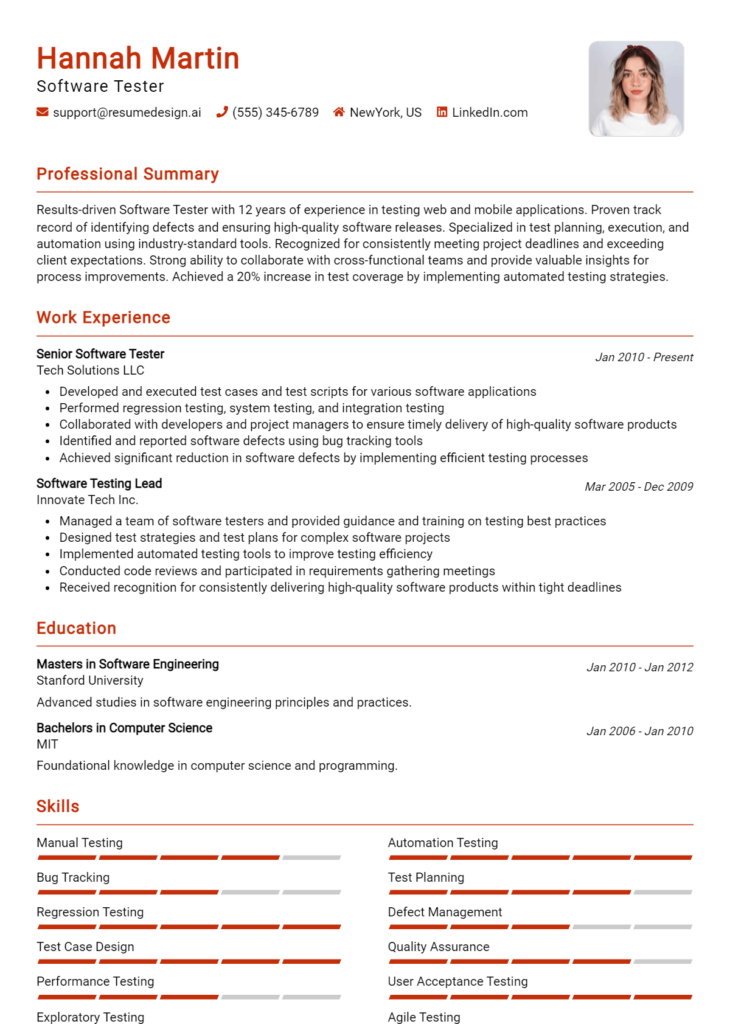Quality Assurance Analyst Core Responsibilities
A Quality Assurance Analyst plays a crucial role in ensuring the quality and performance of products by testing and validating software applications. This position requires a blend of technical expertise, operational understanding, and strong problem-solving skills to effectively bridge the gap between development, product management, and end-users. Success in this role contributes significantly to the organization’s goals by enhancing product reliability and user satisfaction. A well-structured resume highlighting these qualifications can greatly improve job prospects.
Common Responsibilities Listed on Quality Assurance Analyst Resume
- Develop and execute test plans, test cases, and test scripts.
- Identify, document, and track defects and issues throughout the testing process.
- Collaborate with development teams to understand project requirements and specifications.
- Perform regression, integration, and user acceptance testing.
- Analyze test results and provide feedback for product improvement.
- Ensure compliance with industry standards and best practices.
- Conduct root cause analysis for defects and recommend solutions.
- Maintain detailed documentation of testing processes and results.
- Participate in project meetings and provide status updates on testing progress.
- Utilize automated testing tools to enhance testing efficiency.
- Stay updated on emerging testing tools and technologies.
High-Level Resume Tips for Quality Assurance Analyst Professionals
A well-crafted resume is crucial for Quality Assurance Analyst professionals, as it often serves as the first impression a candidate makes on a potential employer. In a competitive job market, a resume needs to effectively showcase not only your technical skills and expertise but also your achievements and contributions to previous roles. A strong resume can set you apart, demonstrating your value to prospective employers and making a compelling case for why you should be invited for an interview. This guide will provide practical and actionable resume tips specifically tailored for Quality Assurance Analyst professionals, helping you to present yourself in the best light possible.
Top Resume Tips for Quality Assurance Analyst Professionals
- Tailor your resume to each job description by incorporating relevant keywords and phrases that match the requirements of the position.
- Highlight your relevant experience in quality assurance, including specific projects and methodologies you have worked with, such as Agile or Waterfall.
- Quantify your achievements with metrics wherever possible, such as the percentage of defects reduced or the time saved through process improvements.
- Showcase your expertise in industry-specific tools and technologies, like Selenium, JIRA, or TestRail, to demonstrate your capabilities.
- Include a summary statement at the top that encapsulates your experience and career objectives, tailored to the QA field.
- Emphasize your problem-solving skills and ability to work collaboratively in cross-functional teams.
- List relevant certifications, such as ISTQB or CSTE, to establish your commitment to professional growth and industry standards.
- Use clear, concise language and bullet points to improve readability and make your accomplishments stand out.
- Keep the formatting clean and professional, ensuring consistency in font, size, and style throughout the document.
By implementing these tips, you can significantly increase your chances of landing a job in the Quality Assurance Analyst field. A well-structured and targeted resume not only showcases your skills and achievements but also demonstrates your understanding of industry expectations, ultimately making you a more attractive candidate to potential employers.
Why Resume Headlines & Titles are Important for Quality Assurance Analyst
In the competitive field of Quality Assurance, a well-crafted resume headline or title serves as a critical first impression for job seekers. It encapsulates the essence of a candidate's qualifications and expertise in a succinct manner, allowing hiring managers to quickly assess their fit for the role. A strong headline can immediately grab attention, effectively summarizing key qualifications and creating curiosity about the candidate's experience. It is essential that the headline is concise, relevant, and directly related to the job being applied for, ensuring that it resonates with the specific requirements of the position.
Best Practices for Crafting Resume Headlines for Quality Assurance Analyst
- Keep it concise: Aim for a headline that is no longer than 10-12 words.
- Be role-specific: Tailor your headline to reflect the Quality Assurance Analyst position you are applying for.
- Highlight key skills: Incorporate specific skills or tools relevant to QA, such as automated testing or defect tracking.
- Use impactful language: Choose strong action words that convey your strengths and experiences.
- Showcase achievements: If possible, include quantifiable results or accomplishments that set you apart.
- Maintain professionalism: Ensure your headline conveys a professional tone suitable for the industry.
- Utilize keywords: Incorporate relevant keywords from the job description to enhance visibility.
- Be authentic: Reflect your true capabilities and experiences rather than exaggerating or using buzzwords.
Example Resume Headlines for Quality Assurance Analyst
Strong Resume Headlines
Detail-Oriented Quality Assurance Analyst with 5+ Years in Automated Testing
Results-Driven QA Analyst Specializing in Agile Methodologies and Continuous Improvement
Skilled Quality Assurance Analyst with Proven Track Record in Defect Reduction
Weak Resume Headlines
Quality Assurance Analyst Seeking Job
Experienced in Quality Assurance
The strong headlines are effective because they provide clear, specific insights into the candidate's skills, experience, and unique attributes, making them memorable and relevant to hiring managers. They stand out by highlighting accomplishments and using action-oriented language that aligns with the job's requirements. In contrast, the weak headlines lack specificity and creativity, failing to convey any substantial information or interest, which can lead to being overlooked in a sea of applications.
Writing an Exceptional Quality Assurance Analyst Resume Summary
A resume summary is a critical component for any Quality Assurance Analyst seeking to make a strong impression on potential employers. In a competitive job market, hiring managers often sift through numerous applications, and a well-crafted summary serves as the first touchpoint to showcase your qualifications. A strong summary effectively highlights key skills, relevant experience, and notable accomplishments, allowing you to quickly capture the attention of the reader. It should be concise, impactful, and meticulously tailored to align with the specific job description, ensuring that your unique value proposition stands out from the crowd.
Best Practices for Writing a Quality Assurance Analyst Resume Summary
- Quantify achievements where possible to demonstrate impact (e.g., reduced defect rates by 30%).
- Focus on relevant skills that align with the job description, such as automation testing or manual testing expertise.
- Tailor the summary for each job application by incorporating keywords and phrases from the job listing.
- Keep it concise—ideally between 2-4 sentences—to maintain the hiring manager's attention.
- Highlight specific tools and technologies you are proficient in, such as Selenium, JIRA, or TestRail.
- Showcase your understanding of the software development lifecycle (SDLC) and quality assurance methodologies.
- Emphasize soft skills, such as attention to detail and strong problem-solving capabilities.
- Avoid using generic phrases that could apply to any candidate; instead, infuse your personality and unique experiences.
Example Quality Assurance Analyst Resume Summaries
Strong Resume Summaries
Detail-oriented Quality Assurance Analyst with over 5 years of experience in manual and automated testing. Successfully reduced software defects by 40% through rigorous testing and quality control processes in a fast-paced Agile environment.
Results-driven QA Analyst with expertise in Selenium and JIRA, focusing on enhancing product quality. Led a cross-functional team that improved testing efficiency by 25%, leading to a 15% decrease in time-to-market for multiple software releases.
Experienced Quality Assurance Analyst with a proven track record in developing automated test scripts that increased test coverage by 30%. Passionate about delivering high-quality software solutions and improving user satisfaction.
Weak Resume Summaries
Dedicated QA Analyst with experience in testing software applications. I am a team player and enjoy working in quality assurance.
Quality Assurance professional looking for an opportunity to apply my skills in a challenging environment. I have some experience in testing and quality control.
The examples of strong resume summaries are considered effective because they provide specific, quantifiable achievements and relevant skills that directly relate to the Quality Assurance Analyst role. They demonstrate the candidate's impact on previous projects and their proficiency with tools that are in demand. In contrast, the weak resume summaries lack detail and specificity, presenting vague statements that do not highlight unique skills or accomplishments. This makes them less compelling and memorable to hiring managers seeking standout candidates.
Work Experience Section for Quality Assurance Analyst Resume
The work experience section of a Quality Assurance Analyst resume is critical as it serves as a testament to the candidate's technical skills, leadership capabilities, and ability to deliver high-quality products. This section not only highlights the practical application of QA methodologies and tools but also demonstrates the candidate's capacity to manage teams effectively and contribute to the overall success of projects. By quantifying achievements and aligning experiences with industry standards, candidates can significantly enhance their appeal to potential employers, showcasing their value in improving product quality and ensuring customer satisfaction.
Best Practices for Quality Assurance Analyst Work Experience
- Focus on quantifiable results, such as defect reduction percentages or improvements in testing efficiency.
- Highlight specific technical skills relevant to QA, including tools and methodologies used in previous roles.
- Emphasize collaboration with cross-functional teams, demonstrating effective communication and teamwork.
- Include examples of leadership, such as mentoring junior analysts or leading QA initiatives.
- Align your experiences with industry standards and best practices, showcasing awareness of current trends.
- Use action verbs to convey a sense of proactivity and impact in your roles.
- Tailor your work experience to the specific job requirements of the position you are applying for.
- Incorporate feedback from performance reviews or client testimonials to support your claims of success.
Example Work Experiences for Quality Assurance Analyst
Strong Experiences
- Led a team of 5 QA analysts in the implementation of an automated testing framework, resulting in a 30% reduction in testing time and a 25% decrease in post-release defects.
- Developed and executed comprehensive test plans for a major software release, achieving a 98% test coverage and ensuring all critical features were validated ahead of schedule.
- Collaborated with development and product teams to refine requirements, leading to a 40% improvement in user acceptance testing outcomes.
- Implemented a continuous integration/continuous deployment (CI/CD) pipeline that improved deployment frequency by 50% while maintaining a defect rate of less than 1%.
Weak Experiences
- Performed testing for software applications.
- Assisted in team meetings and discussed project updates.
- Helped with documenting test cases and reporting bugs.
- Worked on various testing tasks as needed.
The examples of strong experiences are considered effective because they provide specific, quantifiable outcomes that clearly demonstrate the candidate's impact on project success and team performance. They highlight technical leadership and collaboration, showcasing the candidate's ability to drive significant improvements. In contrast, the weak experiences lack detail and measurable results, making it difficult for potential employers to gauge the candidate's contributions and effectiveness in previous roles.
Education and Certifications Section for Quality Assurance Analyst Resume
The education and certifications section of a Quality Assurance Analyst resume is crucial as it showcases the candidate's academic foundation and commitment to professional development. This section not only highlights relevant degrees and industry-recognized certifications but also emphasizes the candidate's dedication to continuous learning and improvement in the field of quality assurance. By providing details on pertinent coursework, specialized training, and certifications, candidates can significantly enhance their credibility and demonstrate their alignment with the specific demands of the job role.
Best Practices for Quality Assurance Analyst Education and Certifications
- Prioritize relevant degrees, such as Computer Science, Information Technology, or Engineering.
- Include industry-recognized certifications like ISTQB, CSTE, or CSQA to validate expertise.
- Highlight any specialized training in testing tools and methodologies that apply to the role.
- Provide details on relevant coursework that demonstrates knowledge of quality assurance principles.
- List any ongoing education or professional development courses to show commitment to the field.
- Use clear and concise formatting for easy readability, ensuring key qualifications stand out.
- Tailor the section to match the specific requirements of the job description.
- Consider including GPA or honors if they are particularly impressive and relevant.
Example Education and Certifications for Quality Assurance Analyst
Strong Examples
- Bachelor of Science in Computer Science, XYZ University, Graduated May 2022
- ISTQB Certified Tester Foundation Level (CTFL), Earned March 2023
- Certified Software Quality Analyst (CSQA), Completed December 2022
- Relevant Coursework: Software Testing, Quality Assurance Practices, and Agile Development
Weak Examples
- Associate Degree in General Studies, ABC Community College, Graduated June 2015
- Certification in Basic Computer Skills, Completed January 2020
- High School Diploma, DEF High School, Graduated 2010
- Old Certification in Manual Testing (Expired 2018)
The strong examples are considered effective because they directly relate to the qualifications and skills required for a Quality Assurance Analyst role, showcasing both formal education and relevant certifications that enhance the candidate's profile. In contrast, the weak examples lack specificity and relevance to the position, featuring outdated or general qualifications that do not align with the expectations of a Quality Assurance Analyst, thereby diminishing the candidate's appeal to potential employers.
Top Skills & Keywords for Quality Assurance Analyst Resume
As a Quality Assurance Analyst, possessing a diverse set of skills is crucial for ensuring that software products meet the highest standards of quality. The role demands both technical proficiency and strong interpersonal abilities, allowing analysts to effectively identify issues and collaborate with development teams. A well-crafted resume that highlights these skills not only showcases your expertise but also helps you stand out in a competitive job market. By emphasizing the right combination of soft and hard skills, you can demonstrate your capability to contribute to the success of software projects and ensure customer satisfaction.
Top Hard & Soft Skills for Quality Assurance Analyst
Soft Skills
- Attention to Detail
- Analytical Thinking
- Problem Solving
- Effective Communication
- Team Collaboration
- Time Management
- Adaptability
- Critical Thinking
- Conflict Resolution
- Creativity
Hard Skills
- Test Case Development
- Automated Testing Tools (e.g., Selenium, JUnit)
- Manual Testing Techniques
- Bug Tracking Systems (e.g., JIRA, Bugzilla)
- API Testing
- SQL for Database Testing
- Performance Testing
- Knowledge of Software Development Life Cycle (SDLC)
- Version Control Systems (e.g., Git)
- Familiarity with Agile Methodologies
By focusing on these essential skills, you can strengthen your resume and align yourself with the expectations of hiring managers in the field. For more insights on how to effectively showcase your skills and work experience, consider tailoring your application to reflect the specific requirements of the job you are targeting.
Stand Out with a Winning Quality Assurance Analyst Cover Letter
Dear [Hiring Manager's Name],
I am writing to express my enthusiasm for the Quality Assurance Analyst position at [Company Name], as advertised on [where you found the job listing]. With a solid background in software testing and a keen eye for detail, I am excited about the opportunity to contribute to your team. My experience in both manual and automated testing environments has equipped me with the skills necessary to ensure the highest quality of software products, aligning perfectly with your company's commitment to excellence.
In my previous role at [Previous Company Name], I successfully led a team of QA analysts in implementing a robust testing framework that increased defect detection rates by 30%. I leveraged various testing methodologies, including regression, performance, and user acceptance testing, to ensure that all software releases met stringent quality standards. My proficiency with testing tools such as Selenium and JIRA, combined with my strong analytical skills, allows me to effectively identify and troubleshoot issues, ensuring a seamless user experience.
Moreover, I am a strong advocate for collaboration and communication within cross-functional teams. By working closely with developers, product managers, and other stakeholders, I have fostered an environment where quality is a shared responsibility. I believe that my proactive approach to problem-solving and my commitment to continuous improvement will make me a valuable asset to [Company Name]. I am excited about the possibility of bringing my expertise in QA to your organization and contributing to the development of top-notch software solutions.
Thank you for considering my application. I look forward to the opportunity to discuss how my skills and experiences align with the needs of your team. I am eager to help [Company Name] achieve its quality assurance goals and contribute to the success of your projects.
Sincerely,
[Your Name]
[Your Phone Number]
[Your Email Address]
Common Mistakes to Avoid in a Quality Assurance Analyst Resume
When crafting a resume for a Quality Assurance Analyst position, candidates often overlook some critical elements that can make or break their chances of landing an interview. A well-structured resume is essential to showcase your skills, experience, and attention to detail—traits that are particularly important in quality assurance. Here are some common mistakes to avoid when writing your Quality Assurance Analyst resume:
Vague Job Descriptions: Failing to provide specific details about your previous roles can leave potential employers unsure of your qualifications. Use clear, quantifiable achievements to demonstrate your impact.
Ignoring Keywords: Many companies use applicant tracking systems (ATS) to screen resumes. Not including relevant keywords from the job description can lead to your resume being filtered out before it reaches human eyes.
Overlooking Soft Skills: While technical skills are crucial, quality assurance also requires strong communication and problem-solving abilities. Neglecting to highlight these soft skills could make your resume less appealing.
Inconsistent Formatting: A cluttered or inconsistent resume layout can distract hiring managers. Ensure uniformity in font, bullet points, and spacing for a polished appearance.
Listing Responsibilities Instead of Achievements: Simply listing duties without showcasing accomplishments can diminish the impact of your experience. Focus on what you achieved in each role rather than what you were responsible for.
Neglecting Continuous Learning: The tech landscape is ever-evolving. Failing to mention relevant certifications, training, or courses can suggest that you are not keeping up with industry trends.
Using Jargon Without Explanation: Avoid overly technical language or acronyms that may not be familiar to everyone. Make your resume accessible by explaining any specific terms or technologies you reference.
Not Tailoring the Resume for Each Application: Sending out a generic resume can hurt your chances. Take the time to customize your resume for each job application to align your skills and experiences with the specific requirements of the role.
Conclusion
As a Quality Assurance Analyst, your role is crucial in ensuring that products meet the highest standards of quality before they reach customers. Throughout this article, we've discussed the essential skills and qualifications necessary for this position, including attention to detail, analytical thinking, and proficiency in various testing methodologies. We also explored the importance of collaboration with development teams and stakeholders to identify issues early in the development process and refine processes for better outcomes.
In conclusion, if you are looking to advance your career as a Quality Assurance Analyst, it's vital to present a polished and professional resume that highlights your expertise and experience. We encourage you to take the time to review your resume and ensure it aligns with the key points discussed in this article.
To assist you in this process, consider utilizing available resources such as resume templates, which can provide a solid foundation for your document. Additionally, a resume builder can help you craft a customized resume that showcases your skills effectively. If you're seeking inspiration, check out resume examples that demonstrate successful formats and content. Finally, don't overlook the significance of a compelling cover letter; use our cover letter templates to create a strong introduction to your application.
Take action today and fine-tune your Quality Assurance Analyst resume to make a lasting impression on potential employers!

